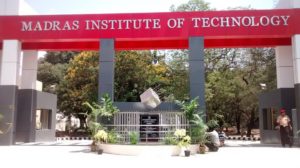In this noble effort, Mr.Rajam enjoyed the inspired assistance of a few distinguished citizens, notably Subbaraya Aiyar, M.K. Ranganathan, L.Venkatakrishna Iyer, K.Srinivasan and C.R. Srinivasan and also generous donations from the public and industries. Thus in July 1949, the MIT was established as an All India Technological Institution with the two-fold objectives of providing
1. Engineering education of University standard in specialised fields and
2. Facilities for research in these and allied fields, free from regional limitations both in regard to its staff and students.
Unique Experiment:
At a time when all other Engineering Institutions were offering conventional courses in Civil, Mechanical and Electrical Engineering at the Under-graduate level, it was the rare innovation and foresight of Mr. Rajam that impelled him in the eve of his life to launch on a bold experiment of introducing for the first time in our country, totally new areas of specialisation in Engineering, viz. Aeronautical Engineering, Automobile Engineering, Electronics Engineering and Instrumentation Technology, the entrants to these disciplines being Science graduates. This was a pioneering step in engineering education in India. How wise and foreseeing this selection was, is shown by the striking growth that India has made in road transport and in the manufacture of road vehicles of all types; in the progress of civil and military aviation and the manufacture of military aircraft; and in the enormous growth in the applications of electronics and the electronics manufacturing industry. Instrumentation and Control which form the bedrock of industry did not exist in India as a subject of study in 1949; even the name was still below the horizon. Now this branch of applied science and technology has become all important in every industry, small or big, light or heavy. How useful and relevant the trained manpower in these fields has been, is borne out by the fact that a significantly large number of the past students of MIT are now holding key positions in research and development organisations, manufacturing industries and educational institutions within the country and abroad. The broad-based curriculum at the MIT has indeed proved to be particularly advantageous with the ever-increasing need for engineers adequately equipped to handle a wide range of problems.
Humble Beginnings and Herculean Efforts:
The Institute owes its present stature to the unstinted efforts and dynamic leadership of its Founders, Chairmen and Members of the Governing Council, Directors, Staff and Alumni and also, in no small measure, to the quality and character of its students during the last 50 years.






